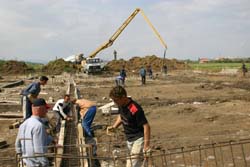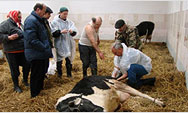You are here » Home » Telling Our Story
Success Story
Business owner builds
the first pharmaceutical
plant in the region to
comply with European
quality standards
Pharmaceuticals, from Humble to Hi-Tech

| |
Photo: Karen Byrne, Chemonics International
|
|
Workers begin construction on the
32,000 square-foot pharmaceutical
plant, the first in the region to comply
with European quality standards.
Eventually, the plant will
have four production lines
and two shifts, with 75
employees and an annual
output of 5 million units.
|
“This one is my favorite,” says Nexhdet Kondirolli. He flips a switch and the pill bottle-filling machine whirs to life. “This machine bottles 2,500 pills every hour. The new one will bottle 200 pills every minute.” In the room, nine employees mix drugs using machines cobbled together after Nexhdet’s old factory burned down in Kosovo’s 1999 war.
Production at the company is on hold while Nexhdet pours all his energy — and $2 million of venture capital from Austria’s Horizonte Venture Management — into building the first pharmaceutical plant in the region to comply with European quality standards. The intended market is 10 million customers in Kosovo, Albania, Macedonia and Bosnia-Herzegovina.
Nexhdet’s ambitious plan took a huge leap forward when USAID connected him with Horizonte and helped him obtain a manufacturing license, develop a business plan and close the financing deal in January 2004. USAID continues to provide technical support as Nexhdet works to bring his first products — infusions, syrups and creams — online. Eventually, the plant will have four production lines and two shifts, with 75 employees and an annual output of 5 million units.
At the construction site near Pristina, workers from Siborra Panelli, another USAID client, are preparing the concrete floor that will eventually be laser-leveled — vital to ensure airtight operations in the sterile “clean rooms” where medical infusion bags will be produced. Siborra will erect the 32,000 square-foot shell, and then construction will start on the interior labs, airlocks and clean rooms required for compliance with Good Manufacturing Practices, a quality control regimen that guarantees product safety, purity and effectiveness. GMP certification is essential for gaining entry into regional markets.
Nexhdet, who earned a pharmacy degree in 1983, opened Yugoslavia’s first private pharmacy in 1989. Three years later, he bought machinery for a small pharmaceutical production plant, employing 23 staff before the war destroyed it. Between 2001 and 2004, Nexhdet rebuilt his business and brought production back to a third of prewar levels. He says he learned how “improvise and survive” during the hard times. Now the challenge for Kosovo’s entrepreneurs is to think beyond improvisation to standardization, beyond survival to growth.
Print-friendly version of this page (244kb - PDF)
Click here for high-res photo
Back to Top ^ | 

